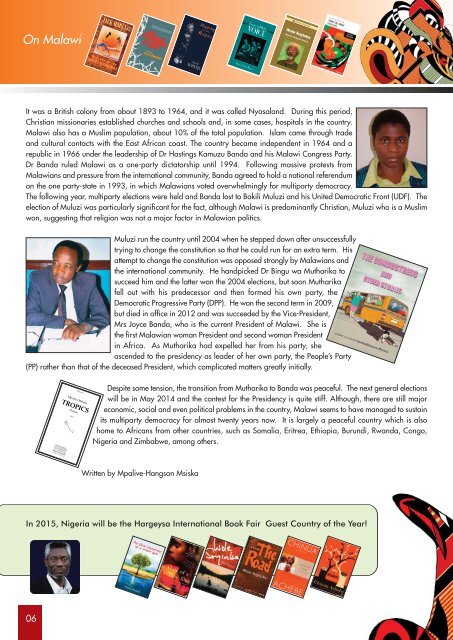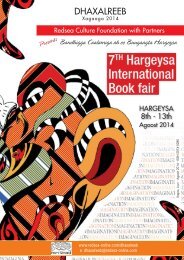1ue4Fis
1ue4Fis
1ue4Fis
Create successful ePaper yourself
Turn your PDF publications into a flip-book with our unique Google optimized e-Paper software.
On Malawi<br />
It was a British colony from about 1893 to 1964, and it was called Nyasaland. During this period,<br />
Christian missionaries established churches and schools and, in some cases, hospitals in the country.<br />
Malawi also has a Muslim population, about 10% of the total population. Islam came through trade<br />
and cultural contacts with the East African coast. The country became independent in 1964 and a<br />
republic in 1966 under the leadership of Dr Hastings Kamuzu Banda and his Malawi Congress Party.<br />
Dr Banda ruled Malawi as a one-party dictatorship until 1994. Following massive protests from<br />
Malawians and pressure from the international community, Banda agreed to hold a national referendum<br />
on the one party-state in 1993, in which Malawians voted overwhelmingly for multiparty democracy.<br />
The following year, multiparty elections were held and Banda lost to Bakili Muluzi and his United Democratic Front (UDF). The<br />
election of Muluzi was particularly significant for the fact, although Malawi is predominantly Christian, Muluzi who is a Muslim<br />
won, suggesting that religion was not a major factor in Malawian politics.<br />
Muluzi run the country until 2004 when he stepped down after unsuccessfully<br />
trying to change the constitution so that he could run for an extra term. His<br />
attempt to change the constitution was opposed strongly by Malawians and<br />
the international community. He handpicked Dr Bingu wa Mutharika to<br />
succeed him and the latter won the 2004 elections, but soon Mutharika<br />
fell out with his predecessor and then formed his own party, the<br />
Democratic Progressive Party (DPP). He won the second term in 2009,<br />
but died in office in 2012 and was succeeded by the Vice-President,<br />
Mrs Joyce Banda, who is the current President of Malawi. She is<br />
the first Malawian woman President and second woman President<br />
in Africa. As Mutharika had expelled her from his party, she<br />
ascended to the presidency as leader of her own party, the People’s Party<br />
(PP) rather than that of the deceased President, which complicated matters greatly initially.<br />
Maanso 1 Mpalive Msiska TROPICS<br />
Mpalive Msiska<br />
TROPICS<br />
Poems<br />
2014<br />
Maanso 1<br />
Despite some tension, the transition from Mutharika to Banda was peaceful. The next general elections<br />
will be in May 2014 and the contest for the Presidency is quite stiff. Although, there are still major<br />
economic, social and even political problems in the country, Malawi seems to have managed to sustain<br />
its multiparty democracy for almost twenty years now. It is largely a peaceful country which is also<br />
home to Africans from other countries, such as Somalia, Eritrea, Ethiopia, Burundi, Rwanda, Congo,<br />
Nigeria and Zimbabwe, among others.<br />
REDSEA-ONLINE.COM<br />
Written by Mpalive-Hangson Msiska<br />
In 2015, Nigeria will be the Hargeysa International Book Fair Guest Country of the Year!<br />
06



